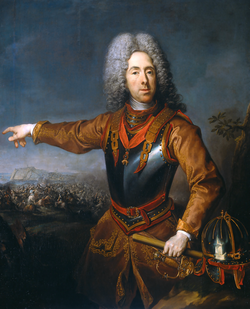Eugene of Savoy
| Prince Eugene of Savoy | |
|---|---|

Prince Eugene of Savoy by Jacob van Schuppen
|
|
| Born |
18 October 1663 Hôtel de Soissons, Paris |
| Died | 21 April 1736 (aged 72) Vienna |
| Buried at | St. Stephen's Cathedral, Vienna |
| Allegiance |
|
| Battles/wars |
Great Turkish War • Siege of Belgrade (1688) • Battle of Zenta Nine Years' War War of the Spanish Succession • Battle of Carpi • Battle of Chiari • Battle of Blenheim • Battle of Turin • Battle of Toulon • Battle of Oudenarde • Siege of Lille • Battle of Malplaquet • Battle of Denain Austro-Turkish War of 1716–18 • Battle of Petrovaradin • Battle of Belgrade War of the Polish Succession |
Prince Eugene of Savoy (French: François-Eugène de Savoie, Italian: Principe Eugenio di Savoia-Carignano, German: Prinz Eugen von Savoyen; 18 October 1663 – 21 April 1736) was a general of the Imperial Army and statesman of the Holy Roman Empire and the Archduchy of Austria and one of the most successful military commanders in modern European history, rising to the highest offices of state at the Imperial court in Vienna.
Born in Paris, Eugene grew up around the French court of King Louis XIV. Based on his poor physique and bearing, the Prince was initially prepared for a career in the church, but by the age of 19 he had determined on a military career. Following a scandal involving his mother Olympe, he was rejected by Louis XIV for service in the French army. Eugene moved to Austria and transferred his loyalty to the Habsburg Monarchy.
Spanning six decades, Eugene served three Holy Roman Emperors: Leopold I, Joseph I, and Charles VI. He first saw action against the Ottoman Turks at the Siege of Vienna in 1683 and the subsequent War of the Holy League, before serving in the Nine Years' War, fighting alongside his cousin, the Duke of Savoy. However, the Prince's fame was secured with his decisive victory against the Ottomans at the Battle of Zenta in 1697, earning him Europe-wide fame. Eugene enhanced his standing during the War of the Spanish Succession, where his partnership with the Duke of Marlborough secured victories against the French on the fields of Blenheim (1704), Oudenarde (1708), and Malplaquet (1709); he gained further success in the war as Imperial commander in northern Italy, most notably at the Battle of Turin (1706). Renewed hostilities against the Ottomans in the Austro-Turkish War consolidated his reputation, with victories at the battles of Petrovaradin (1716), and the decisive encounter at Belgrade (1717).
...
Wikipedia
